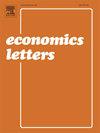关税冲击下的供应链调整:2018-2019 年美国贸易战中企业贸易联系的证据
IF 2.1
4区 经济学
Q2 ECONOMICS
引用次数: 0
摘要
我们利用 2018-2019 年的美国贸易战来研究供应链对关税成本冲击的调整如何影响进口。利用机密贸易数据,我们表明,贸易战期间美国关税商品进口量的下降主要是由企业退出进口市场、买方与供应商关系中断以及进口进入减少所驱动的。然而,进口集中于较少供应商的关税产品的进口增长下降幅度较小。本文章由计算机程序翻译,如有差异,请以英文原文为准。
Supply chain adjustments to tariff shocks: Evidence from firm trade linkages in the 2018-2019 U.S. trade war
We use the 2018-2019 U.S. trade war to examine how supply chains adjustments to a tariff cost shock affect imports. Using confidential trade data, we show that the decline in U.S. imports of tariffed goods during the trade war was driven primarily by the exit of firms from import markets, discontinued buyer–supplier relationships, and reduced entry into importing. However, tariffed products where imports were concentrated in fewer suppliers exhibited smaller declines in import growth.
求助全文
通过发布文献求助,成功后即可免费获取论文全文。
去求助
来源期刊

Economics Letters
ECONOMICS-
CiteScore
3.20
自引率
5.00%
发文量
348
审稿时长
30 days
期刊介绍:
Many economists today are concerned by the proliferation of journals and the concomitant labyrinth of research to be conquered in order to reach the specific information they require. To combat this tendency, Economics Letters has been conceived and designed outside the realm of the traditional economics journal. As a Letters Journal, it consists of concise communications (letters) that provide a means of rapid and efficient dissemination of new results, models and methods in all fields of economic research.
 求助内容:
求助内容: 应助结果提醒方式:
应助结果提醒方式:


